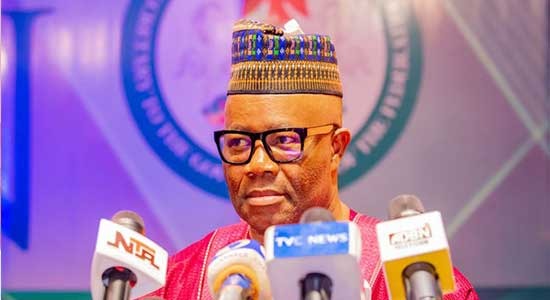“False Claims Surface: Former Aide to Senate President Pushes Baseless Election Fraud Accusations”
 Ata Ikiddeh, a close ally and former aide to Nigeria’s Senate President, Godswill Akpabio, has sparked controversy by falsely accusing a jailed professor of rigging the 2019 Akwa Ibom North-West Senatorial District election in favor of Akpabio’s opponent, Chris Ekpenyong.
Ata Ikiddeh, a close ally and former aide to Nigeria’s Senate President, Godswill Akpabio, has sparked controversy by falsely accusing a jailed professor of rigging the 2019 Akwa Ibom North-West Senatorial District election in favor of Akpabio’s opponent, Chris Ekpenyong.
Ikiddeh, who currently resides in London and previously served as Akpabio’s project monitoring aide during his tenure as governor of Akwa Ibom, made these claims in a Facebook post on February 15. He alleged that Professor Peter Ogban, the returning officer for the 2019 election, had colluded with Ekpenyong’s camp to falsify election results, resulting in Ekpenyong’s victory.
However, the allegations put forward by Ikiddeh are misleading. As revealed in court proceedings, it was Professor Ogban, not Ekpenyong’s camp, who was convicted for election fraud. In March 2021, Ogban was sentenced to three years in prison for tampering with election results during the 2019 senatorial election. The court’s findings showed that Ogban had added thousands of fraudulent votes to Akpabio’s tally in Oruk Anam and Etim Ekpo local government areas, in an attempt to secure Akpabio’s victory.
In his Facebook post, Ikiddeh claimed that Ogban, in collaboration with Akwa Ibom’s Resident Electoral Commissioner Mike Igini, falsified the election results to favor Ekpenyong, despite evidence to the contrary. Ikiddeh further misrepresented the nature of the election fraud, suggesting that Ogban had transported and manipulated collated results, when in fact it was Ogban who had falsified results to benefit Akpabio.
The situation took another twist when Akpabio himself made similar false claims in January 2023 during his campaign for a senatorial seat. At a rally in Oruk Anam, Akpabio falsely stated that a professor, who had helped steal his victory in the 2019 election, was now in prison—a claim later debunked by fact-checkers.
The fraudulent actions of Professor Ogban were well-documented in court. Testimonies from two Independent National Electoral Commission (INEC) witnesses revealed that the results Ogban declared for the APC and PDP in two key local government areas differed significantly from the original figures. Specifically, Ogban added 5,000 votes to the APC’s tally in Oruk Anam and 3,000 votes in Etim Ekpo, drastically altering the outcome of the election.
Despite Ogban’s conviction and the detailed court evidence, Akpabio and his associates continue to attempt to distance themselves from the scandal. The accusations against Ikiddeh’s misleading narrative about the election and the professor’s conviction have raised questions about the efforts to protect Akpabio’s image amid growing concerns over the integrity of his election.
This is not the first time Akpabio has tried to deflect attention from the election fraud scandal. As recently as February, another professor, Ignatius Uduk, was sentenced for his involvement in similar election manipulation, this time for rigging the Essien Udim State Constituency election in favor of an APC candidate with close ties to Akpabio.
As the facts continue to surface, the push to hold accountable those responsible for election fraud becomes more urgent, as public trust in the electoral process continues to be tested by the actions of powerful figures like Akpabio and his associates.













